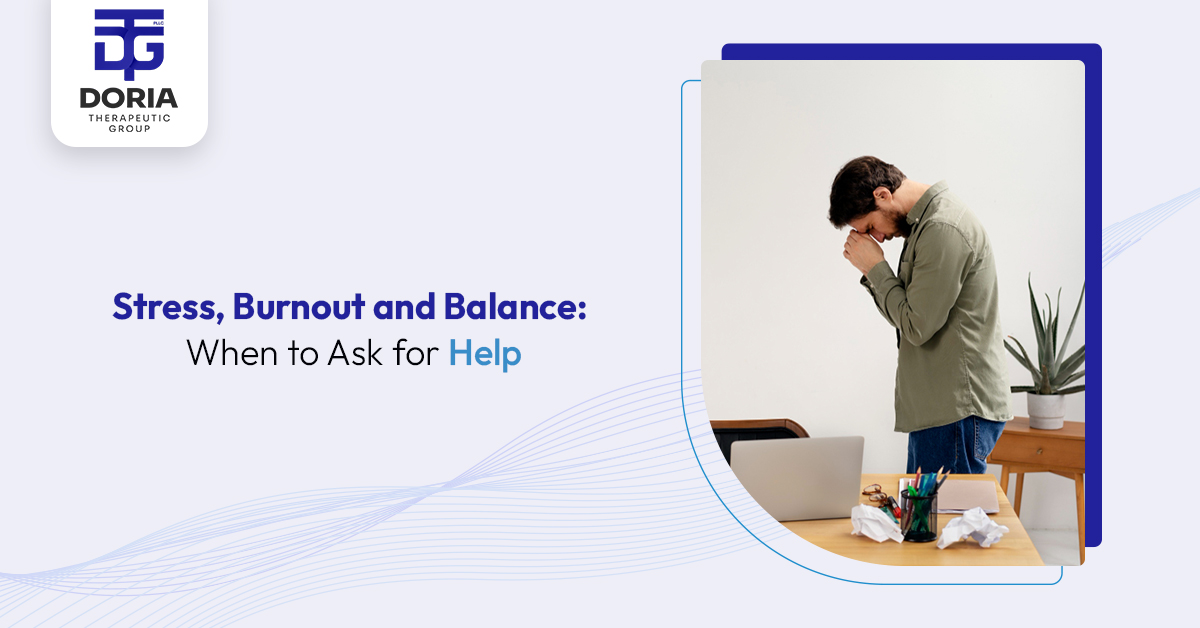Life moves fast. Work demands pile up. Family needs your attention. Social commitments fill your calendar.
Other times, you feel like you are running on empty, yet you continue pushing along.
The fact is, everyone experiences stress.
So, when does everyday stress become something more serious? When is the right moment to ask for help?
In our practice, we often see that asking for help earlier can stop bigger problems down the road.
Being Aware of the Warning Signs
When the stress is overwhelming, your body and mind give signs. Look out for the following:
- You feel tired even after sleeping
- Small problems feel huge
- You snap at people you care about
- Food tastes bland, or you forget to eat
- You can’t focus on simple tasks
- Physical aches appear without a clear cause
These signals are your system’s way of saying it needs support.
Difference Between Burnout and Stress
Stress occurs when things seem to require more than you can manage at a given moment in your life. It comes and goes.
You may be stressed over a work deadline, but the stress goes away when you complete the project.
Burnout runs deeper. It’s what happens when stress continues for weeks or months without relief. Burnout makes you feel:
- Empty inside, like you’ve lost your spark
- Cynical about things that used to matter
- Disconnected from people and activities
- Physically and emotionally drained
- Like nothing you do makes a difference
Why We Hesitate to Ask for Help
Many people resist reaching out. Common thoughts include:
- “This is something I can manage on my own.”
- “Other people have it worse than me.”
- “I don’t wish to overburden anybody.”
- “That is how life is supposed to be.”
Such thoughts are natural yet not always constructive. Asking for help is brave, not a sign of weakness.
Having a Support Network
Assistance comes in various forms. The following options should be considered:
- Reliable friends who do not judge
- Family members who know what you are going through
- Licensed therapists who offer guidance
- Finding support groups of other individuals with similar problems
- Healthcare providers who manage the physical symptoms
Small Steps That Go a Long Way
It is not necessary to change your whole life in one day. Make it small steps:
- Set boundaries around work hours
- Say no to non-essential commitments
- Take small breaks during your day
- Do something you enjoy
- Prioritize sleep and nutrition
When to Speak to a Licensed Professional
Reach out to a therapist when:
- Your symptoms are disrupting your everyday life
- You feel stuck despite trying different approaches
- Relationships suffer because of your stress levels
- You experience alterations to your eating or sleep patterns
- You have thoughts of harming yourself or others
Friends and family are loving but cannot necessarily provide the tools and points of view that a professional therapist will.
Types of Therapy That Can Help
Different therapeutic approaches work well for stress and burnout:
- Cognitive Behavioral Therapy helps you change negative thought patterns that fuel stress
- Individual therapy provides personalized strategies for your specific situation
- Family therapy addresses relationship stress that contributes to burnout
- Group therapy connects you with others facing similar challenges
All the approaches have different benefits and your therapist can assist to identify what best suits you.
Going Forward with Confidence
It is a process to come out of burnout. Development does not occur overnight. There will be easier and harder days. This pattern is normal.
This crucial part is to understand that you need help and do something about it.
This can include:
- Making time to meet with a friend
- Setting new boundaries in the workplace
- Meeting with a professional therapist
Every single step is important.
Get Started
Your mental health requires attention and care. If you identify with these descriptions, take that as a signal to reach out.
Contact Doria Therapeutic Group, PLLC.
Our therapists are familiar with contemporary life and have developed effective methods of handling stress and avoiding burnout.
If you’re having thoughts of self-harm, contact the 988 Suicide & Crisis Lifeline immediately by calling or texting 988.
FAQs
When to seek help for burnout?
Consider reaching out when you experience:
- Feeling emotionally empty for weeks
- Loss of interest in activities you once enjoyed
- Chronic exhaustion that doesn’t improve with rest
- Cynical thoughts about work and relationships
- Feeling like nothing you do matters
When should you seek help for symptoms of stress?
Consider professional support when you notice:
- Trouble concentrating at work
- Avoiding social activities
- Changes in appetite or sleep patterns
- Feeling anxious most days
- Symptoms lasting more than a few weeks
What are the signs of burnout so that you can ask for help?
Look out for these burnout signs:
- Feeling drained even after rest
- Loss of enthusiasm for things you care about
- Frequent illness or physical complaints
- Irritability and hopelessness
- Detachment from work or relationships




